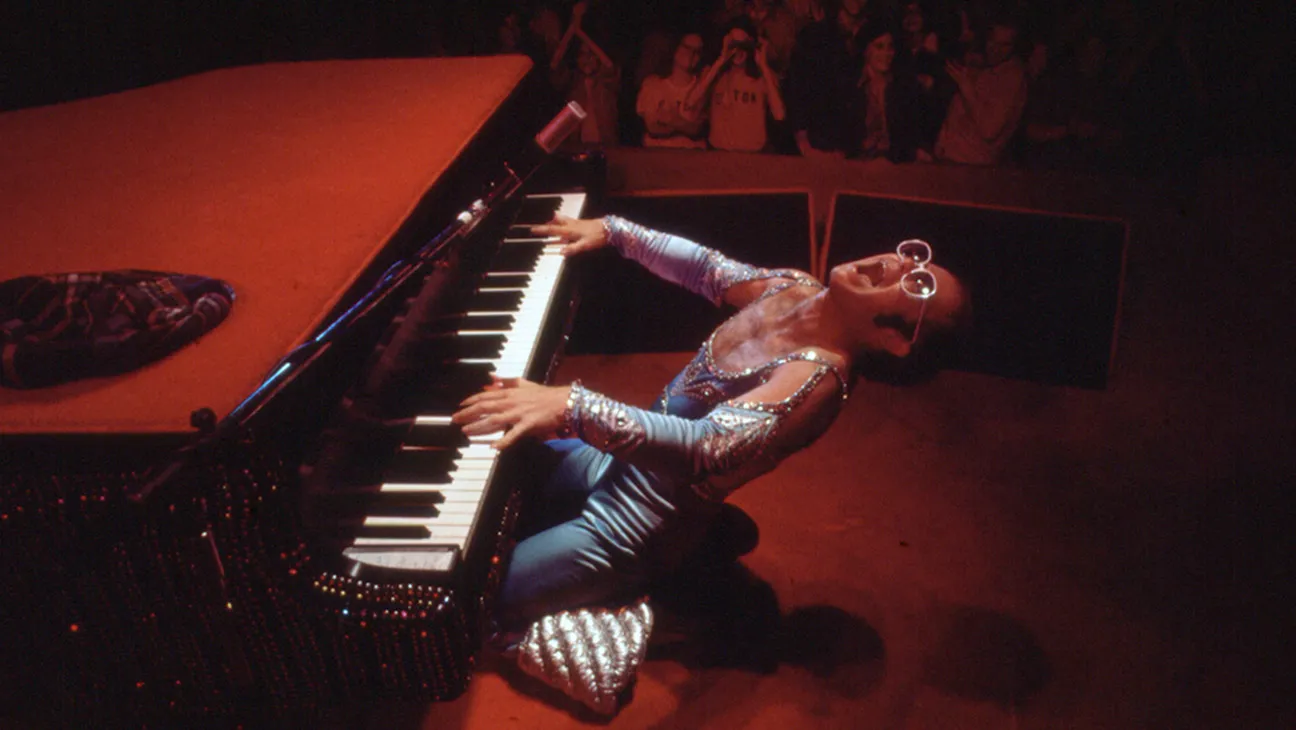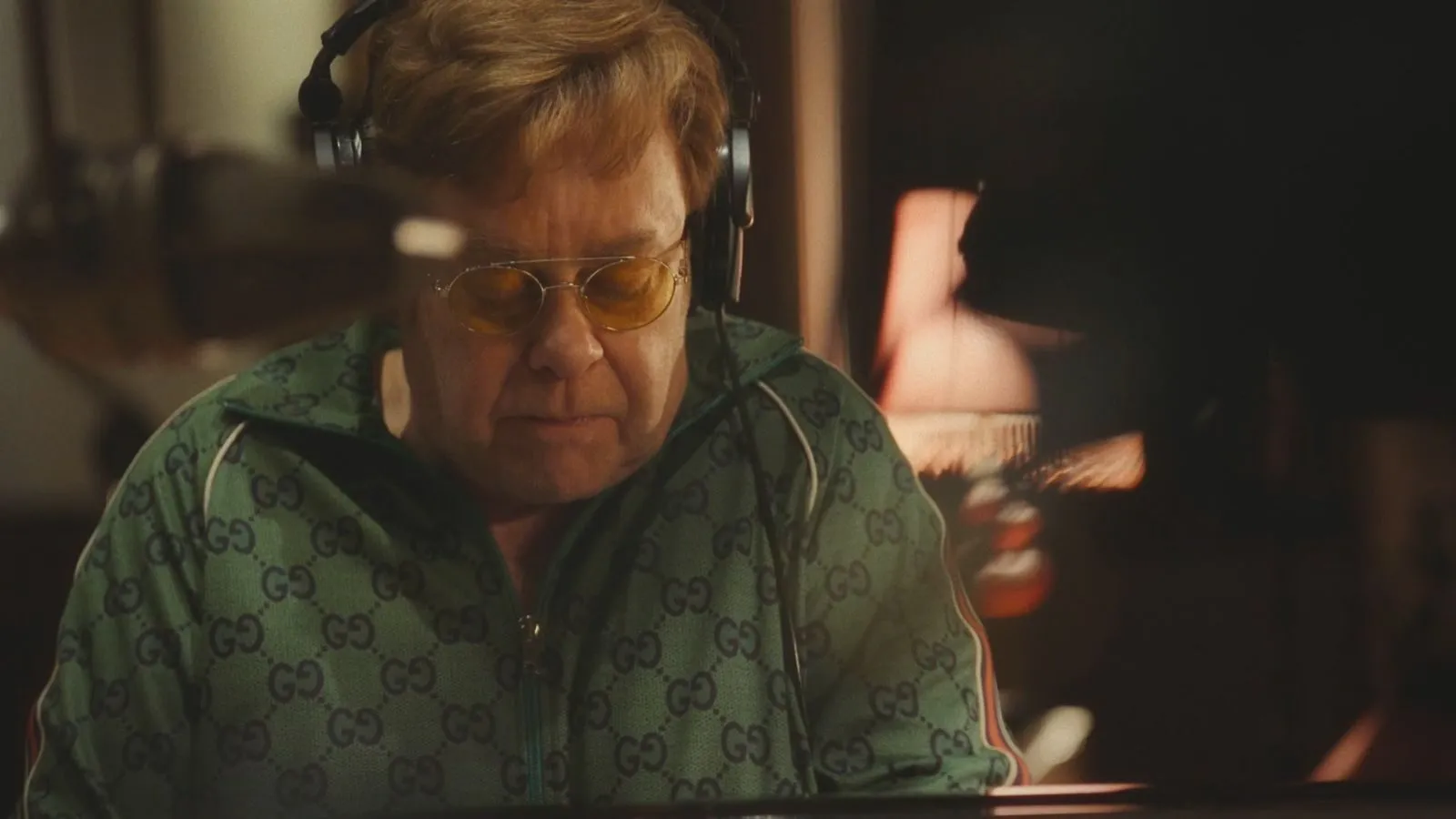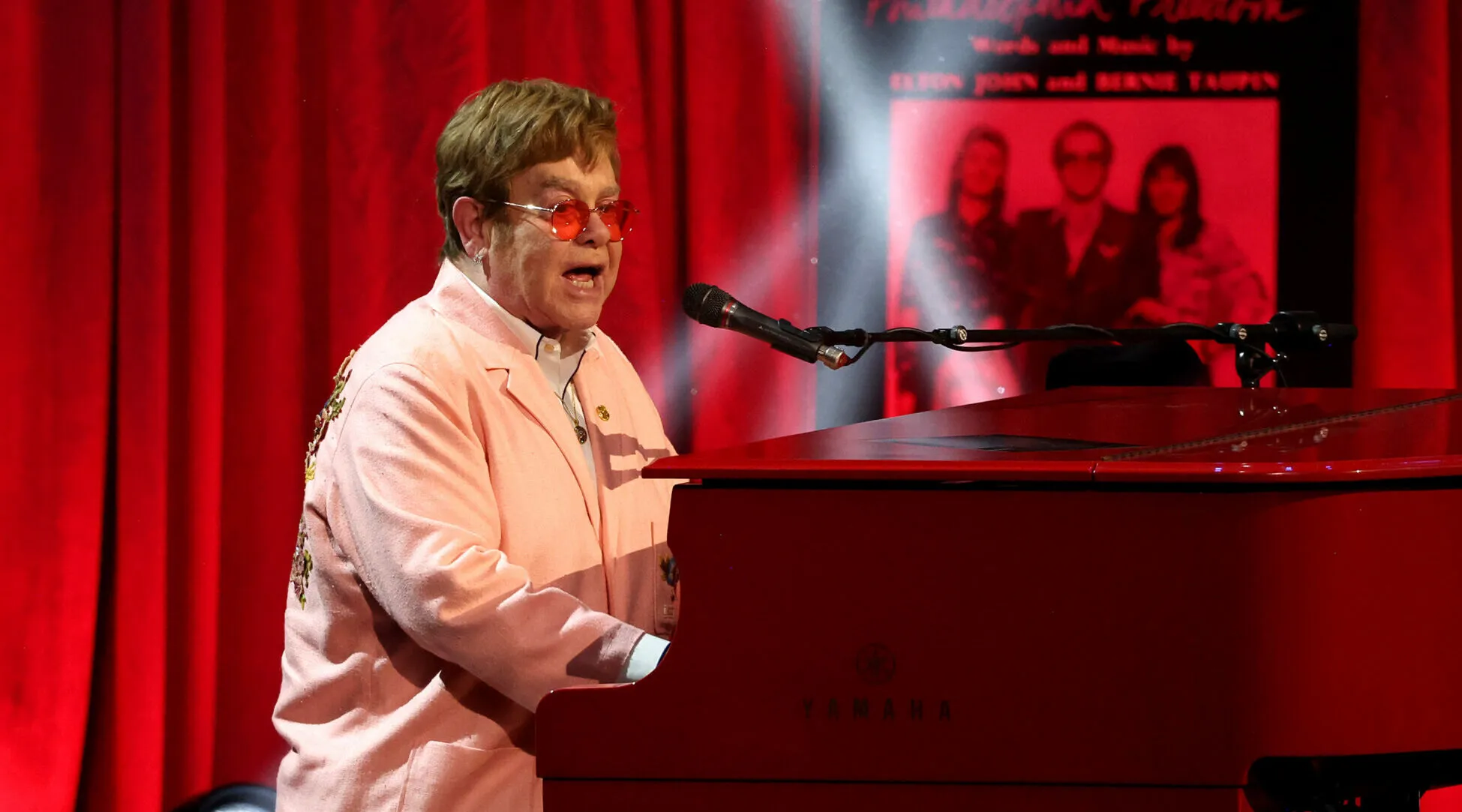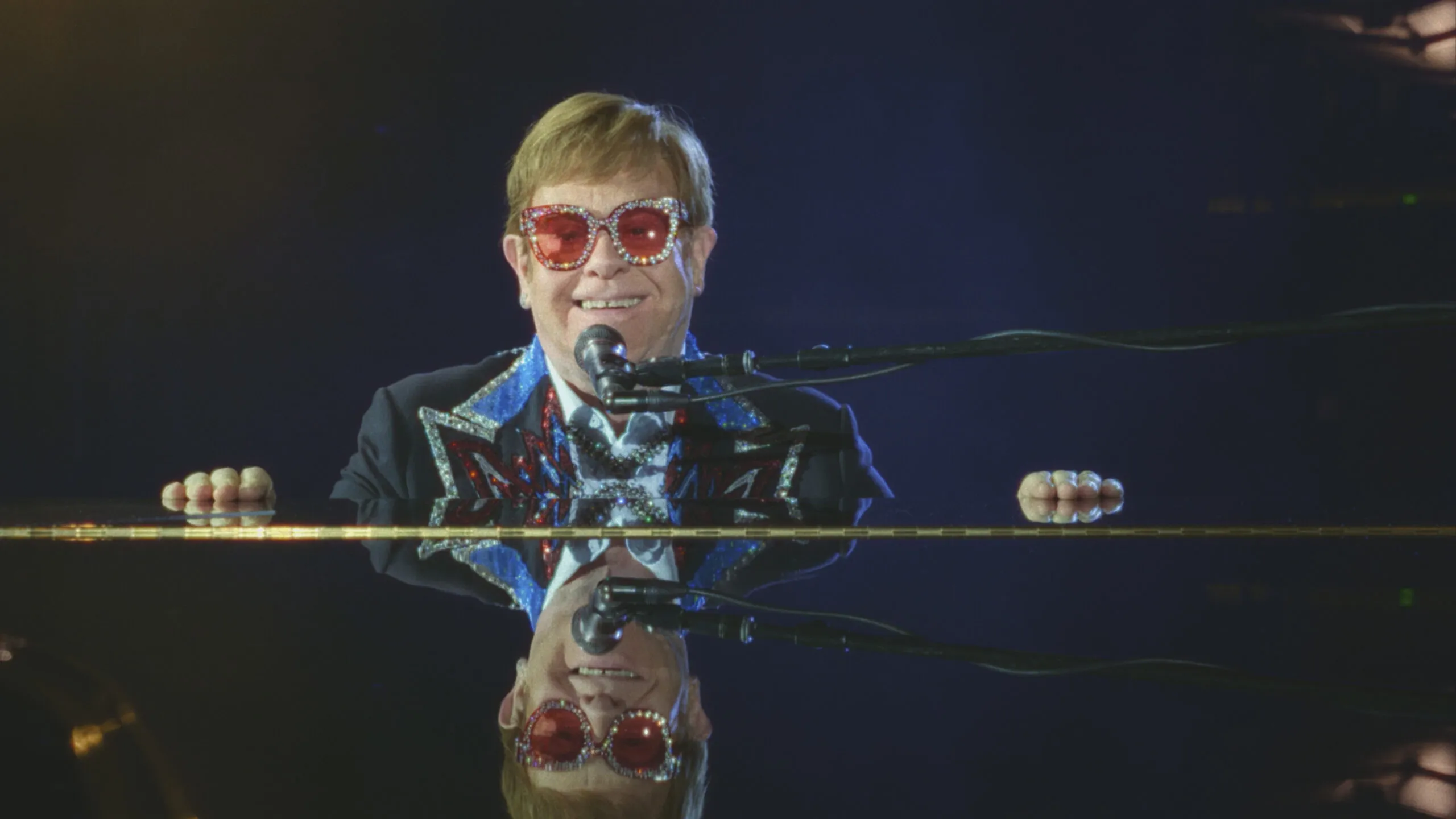Elton John bursting onto the scene in the swinging 70s generated a musical storm that still dazzles audiences today. Never Too Late takes viewers on a trip through the superstar pianist’s incredible journey, from his emergence as a creative powerhouse to his iconic Dodger Stadium performances decades apart. Cut between past and present, the film tells Elton’s awe-inspiring story through his own words and incredible archival footage.
We travel back to the late 1960s to meet a shy young man pouring his soul into songs. After an early collaboration with lyricist Bernie Taupin sparked magic, Elton was unstoppable. Performances at LA’s Troubadour club in 1970 electrified listeners and marked the start of a stratospheric rise.
By 1975’s Dodger Stadium concerts, Elton had captivated over 100,000 fans nightly with his musical mastery and wild costumes. Yet even at his professional peak, personal demons lurked beneath the surface.
Never Too Late also shows Elton’s return to the stadium nearly 50 years later. Fans witness his legendary talent and showmanship once more on the final tour’s North American leg. Behind-the-scenes, we see how Elton’s relationship with music evolved alongside his life changes.
From stardom’s emptiness to finding purpose through family and sobriety, his journey offers both inspiration and introspection for all. By interweaving Elton’s past brilliance with his later reflections, the film shines a light on one artist’s enduring gift to the world—unforgettable songs that continue moving people in every generation.
The creative spark
Never Too Late transports viewers back to Elton’s start, when a young man’s musical gifts first burst forth. Through intimate interviews, we learn of his childhood passion nurtured within his family’s piano lessons. In Elton’s own words, artists like Little Richard and Jerry Lee Lewis fired his imagination, leaving an imprint on the stylistic DNA he’d develop.
After unpaid sessions backing soul greats, Elton’s talents connected him with Bernie Taupin by serendipity. Their partnership lit creative fires—though early efforts found few ears, the seeds of greatness took root. Elton reflects on their unique dynamic sustaining success, crediting Bernie’s lyrical magic for shaping songs born of improvisation.
The film vividly recreates Elton’s Troubadour performances. Seeing footage of his bearded 1970 self in the intimate venue, listeners grasp why industry insiders stayed glued. Elton mesmerizes with flawless playing and soul-bearing vocals, hinting at superstardom soon to come. His self-titled second album brought Gus Dudgeon on board, whose production Touch gave Elton’s distinctive sound wings to soar.
As singles climbed charts, Elton manifested a live dynamo. Concert scenes transport viewers to the euphoria of crowds witnessing musical mastery. But it was the landmark album Goodbye Yellow Brick Road cementing his genius, featuring timeless songs emerging from Elton and Bernie’s magic kitchen. Viewers follow Elton’s ascent with renewed awe—little wondering how high his talents would elevate popular music.
Life in the spotlight
By the mid-70s, Elton stood at a pinnacle few ever reach. Never Too Late immerses us in the spectacle of his 1975 Dodger Stadium spectacular. Through passionate performance clips, one feels within the sold-out carnival of over 100,000 fans. Yet for Elton, nowhere to hide.
In interviews, he recalls the emptiness under Fame’s glare. Wealth and worship left an Elton adrift, drowning in substances to mute inner turmoil. His relationship with manager John Reid complicated matters, fueled by drugs and desperate for affection.
Elton played the rockstar as expected, but cameras caught little of the demon voices haunting even joyous moments. The grainy shots depicting opulence camouflaged a hurting soul, loneliness his constant companion. His cries of pain today land heavier, context unlocking a lifetime’s worth of wisdom.
Then, as now, Elton’s openness awakens empathy. While his art thrilled the masses, only he knows the true cost. The once dizzying highs proved a double-edged sword. Yet out of darkness emerged lessons guiding others toward light—proof that our deepest struggles sometimes birth compassion for all.
Finding peace within
Never Too Late reveals Elton’s humanity beyond his larger-than-life persona. He reflects on his childhood and the unhappiness that festered, fueling doubts only fame magnified. Liberation emerged when he spoke his truth, yet emotional freedom took longer to find.
Glimpses into present-day life offer affectionate portraits. Laughing with loved ones backstage contrasts darker memories. His children inspire joy far removed from past dependencies. Reminiscing on wilder times, Elton now values quiet joys and the fullness family brings.
Throughout, Elton’s honest introspection shines. He accepts both past mistakes and life’s beauty found anew. Where performance once filled an inner void, today his worth isn’t defined by applause but by human bonds. Having fulfilled a musical prophecy, Elton’s journey reminds us that peace lies not in any role but within ourselves—a comfort his art helps others find too.
Elton’s enduring magic on stage
A highlight across documentary and film history are rare glimpses backstage into artistic genius on full display. Never Too Late treats audiences to Elton in his element, transporting viewers to arenas packed with fans relishing his every move.
From archive clips of glittering 70s concerts, it’s clear why Elton commanded stages worldwide. At the Troubadour bar or London’s Wembley Stadium, his performances dazzle with soulful singing, nimble piano skills, and showmanship far beyond physical stature. The film savors exhilarating footage from Dodger Stadium, framing Elton’s supremacy amid pyrotechnics and outrageous costumes.
Elton’s 2022 gigs exhibit talents undiminished with age. Revisiting classic melodies, his passion engulfs crowds with familiar enthusiasm. Throughout, Elton embodies the fierce devotion driving nearly six decades atop music’s summit. For viewers and lifelong fans alike, these performances encapsulate magic, inspiring each to craft their own unforgettable moments in life.
Shining Light on Elton’s Legend
Never Too Late illuminates Elton John in vivid colors, crafting a moving tribute through archival gems and reflections. Directors Cutler and Furnish artfully animate Elton’s rise, placing fans back in a pivotal era of joy and turmoil.
Their restoration of childhood interviews and Troubadour triumphs bring Elton’s artistic genesis to life. Witnessing his metamorphosis through eras reminds me how profoundly he shaped music. Still, absent deeper analysis, the film falls short of magnifying Elton’s full influence.
Present material offers fleeting glimpses instead of a well-rounded portrait. While dutifully charting Elton’s monuments, critical voices could’ve lifted understanding. Yet by granting intimate access, the film honors its subject on a human scale beyond tabloid treatments.
Ultimately, Cutler and Furnish shine warm light on Elton’s journey through cinema’s collaborative power. For lovers of his art, Never Too Late makes a fitting tribute, effectively reminding society owes musical giants a debt of joy.
The Review
Elton John: Never Too Late
Elton John: Never Too Late succeeds in its primary aim of celebrating one artist's immense influence and legendary career through rich archival media and moving contemporary insights. While not without flaws, the film effectively transports viewers to experience Elton's magic both onstage in his prime and beyond, giving fans and new audiences alike a memorable experience of his music and humanity.
PROS
- Evocative archive performances, interviews, and animated sequences
- Intimate portrait of Elton's songwriting process and creative highs
- Heartfelt glimpses into Elton's family life and evolution as a person
CONS
- Lacks deeper analysis of Elton's cultural impact and artistic legacy
- Underdeveloped present-day segments
- Narrower scope than a comprehensive documentary on his full career



















































